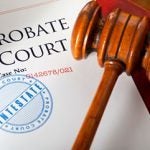
In my estate planning seminars, one of the first subjects we address is estate probate. In fact, at the last seminar, a guest asked what was the origin of the word “probate”? I had to confess that I didn't know. My assistant looked it up during the dinner and we were able to report back that it comes from the Latin word “probare” meaning to test or prove. So to probate a Will is to “prove” it officially so as to establish its validity. The result of the probate process is the certification of the Will as being valid such that the personal representative named in the Will has the authority to carry out its instructions. The probate process takes place in court in accordance with the prevailing rules and statutes. This means it could take a few weeks to a few years to finalize depending on the complexity of the estate and issues involved.
The natural followup to that inquiry is to ask just property has to go through this probate process. So let's start with the case were the deceased died without any Will at all. What then? Well, all property (with some exceptions we'll talk about in a minute) has to go through probate i.e. be distributed in accordance with the laws of intestacy as administered through the court via a person appointed as the administrator. Generally this is not advisable as the law might not work in your favor.
So then if you have a Will, what property is probated through that Will? The answer is all property owned by the deceased that does not convey to a beneficiary as a matter of law. Huh? Many types of investment accounts, retirement plans, savings plans, annuities, insurance policies and the like require the holder to specify a beneficiary in the event of their death. Those beneficiaries inherit those funds automatically by being so designated without having to go to court or through the probate process. They pass to the intended as a matter of law and procedure.
How about property held jointly? If the property is titled as owned by joint tenants in their entirety (married couples) or joint tenants with rights of survivorship, then when one owner dies, their interest automatically passes to the other owner as a matter of law, outside of the probate process.
While this is a generalization, if it doesn't have a beneficiary or isn't jointly owned, it passes through the probate process. In summary, there is probate property and non-probate property. Only the former passes to your heirs via the process of proving the Will. The latter, non-probate property, passes outside of the Will as a matter of law.
Simple, right?

